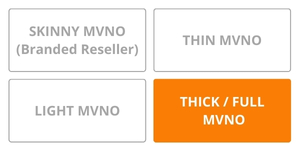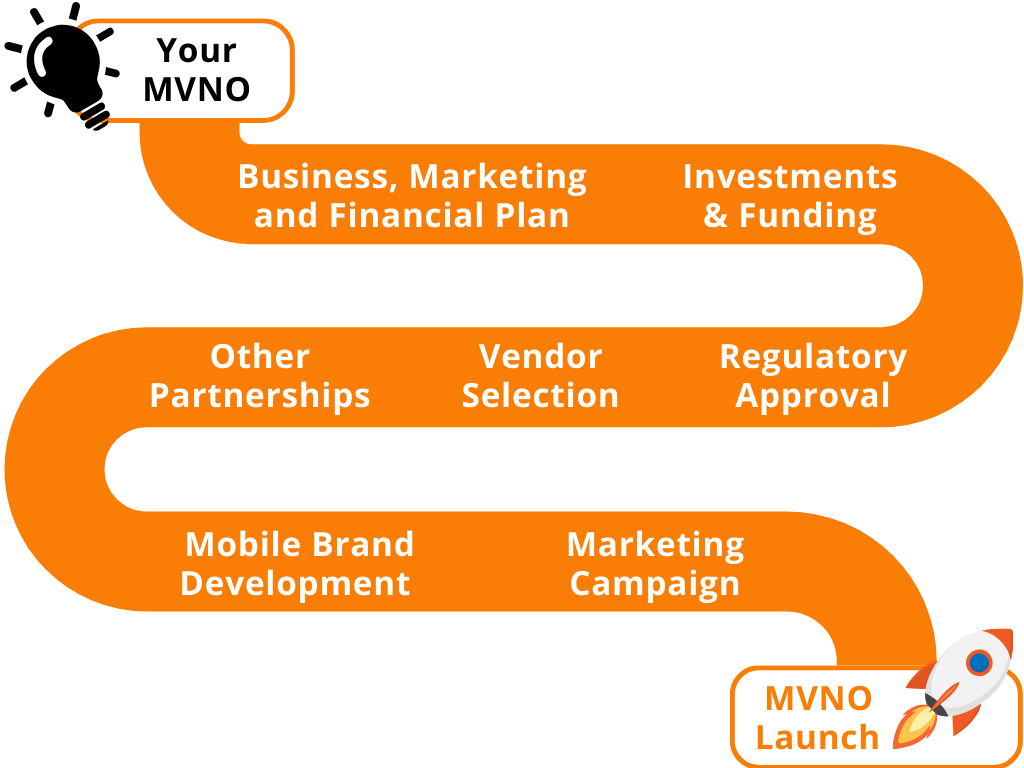Introduction about starting a Business MVNO (Mobile Brands)
A Business MVNO/IOT is empowering corporate communication, creates efficiency and saves costs. Many Businesses / enterprises cover the mobile costs incurred by their employees. Every month, these expenses must be collected, validated, approved, and processed. This arrangement is time-consuming and makes it difficult to control costs.
By launching their own Business MVNO (mobile brand), an enterprise can facilitate comprehensive, high-quality mobile connectivity for their employee-bases from a single platform. This will streamline payment validation and approvals and save both time and money.
Usually Business MNVOs have high-usage and corporate subscribers. They also provide advanced services such as data and group administration.
What do you need to know about starting a Business MVNO/IOT
- What are the advantages and disadvantages ?
- What are the Revenue sources and Pricing strategy?
- What are suitable segments?
- What kind of Mobile bundles are typically used?
- What kind of ARPU can you expect?
- What is the Go-to-Market Strategy?
- What are some points to think of for the Marketing Plan?
- What kind of financing is to be expected?
- What kind of MVNO type is typically used?
- What is the expected time for the launch?
- What is the expected impact of 5G?
- What is the expected impact of eSIM?
- IOT and its Relation to Business MVNOs
- Benefits of Launching Business MVNO/IOT
- Frequently Asked Questions
- Summary
What are the advantages and disadvantages of a Business MVNO/IOT?
Advantages: A Business-focused MVNO offer specialized services tailored to corporate clients, including fax/data and group administration. They excel in providing efficient, business-oriented communication solutions.
Disadvantages: Intense competition in the B2B space demands continuous innovation. Maintaining high-quality customer service and staying ahead in technological advancements are crucial to retain corporate clients.
What are the Revenue sources and Pricing strategy?
Revenue Sources: Main revenue streams come from providing specialized services to businesses, including fax/data services, group administration, and tailored communication solutions.
Pricing Strategy: Offers tiered packages with additional features for larger businesses, ensuring flexibility and scalability.
What are suitable segments/markets for a Business MVNO/IOT?
- Large Business: Offering flexible communication solutions for large corporates with special pricing and scalable plans which they can use for their employees.
- Medium Businesses: Catering to small businesses with group administration features, bulk messaging, and tailored business packages.
- Consulting Firms: Focusing on consulting firms with secure data transmission, conference call services, and client management tools.
- Retailers: Offering retail-specific solutions with point-of-sale integrations, customer engagement tools, and inventory management features.
- Healthcare Providers: Providing secure communication tools for healthcare professionals with HIPAA-compliant messaging and telemedicine integrations.
- Marketing Agencies: Offering marketing agencies solutions for client reporting, campaign tracking, and collaborative tools.
- Real Estate Agents: Providing real estate agents with virtual tours, property management tools, and client communication features.
- Construction Companies: Focusing on construction businesses with job site communication, project management tools, and scheduling solutions.

What kind of Mobile bundles are typically used for a Business MVNO?
Data: Moderate to high demand for emails, cloud services, video conferencing, and business applications. Use case: Email communication, document sharing, virtual meetings.
Voice: High demand for business negotiations, client calls, and conference calls. Use case: Sales calls, client meetings, group discussions.
SMS: Moderate demand for business-related notifications, appointment reminders, and alerts. Use case: Appointment confirmations, order notifications.
What kind of ARPU can you expect?
ARPU: High.
Why: The Business MVNO targets corporate clients and high-usage business users, providing advanced services like voice/data and group administration. Businesses are willing to pay premium prices for reliable, efficient services. Next to this they can use it for their own employees.
Where It Is Based On: ARPU is high due to business clients’ willingness to invest in reliable, business-grade telecommunication services. There are also costs saving on employee usage costs and administration costs.
You need to work out the details in your Financial Plan.

What is the Go-to-Market Strategy for a Business MVNO/IOT?

Network at industry events and business conferences. Forge strategic alliances with business service providers. Develop customizable packages for different business sizes, highlighting efficiency and cost-effectiveness. Offer exceptional after-sales support to ensure client satisfaction and retention.
- Target Audience: Small to medium-sized businesses, entrepreneurs, and corporate clients requiring reliable communication services.
- Pricing Strategy: Transparent pricing, business-oriented plans, and discounts for bulk connections.
- Distribution Channels: Business expos, networking events, and partnerships with business service providers.
- Promotion: Business-focused webinars, thought leadership content, and industry-specific case studies.
- Customer Support: Dedicated business support, account managers for larger clients, and priority issue resolution.
What are some points to think of for the Marketing Plan?
You should focus on B2B networking events, industry conferences, and partnerships with business service providers. You need to work out below points in your Marketing Plan.
USP: Reliable business communication solutions, customized plans, and seamless integration with business tools.
Content Creation: Business productivity tips, cybersecurity insights, and industry-specific best practices.
Promotions: Bundle offers with business software subscriptions, free trials for business tools, and referral discounts.
Partnerships: Partner with business software providers, coworking spaces, and industry associations for mutual referrals.
Feedback: Regular surveys, feedback sessions with business clients, and tailored service enhancements based on business needs.

What kind of financing is to be expected for a Business MVNO?

Financing: Moderate to High
A Business MVNO offers specialized services like data and group administration. Investment is required in robust network infrastructure, specialized customer support for businesses, and tailored service plans. Financing needs depend on the scale and services offered.
You need to work the details in your Financial Plan.
What kind of MVNO type is typically used for Business MVNOs?
MVNO Type: Thick or Full MVNO
Typically Business MVNOs choose a Tick/Full MVNO this is because they require a lot of flexibility and special features. Business MVNOs serve corporate subscribers and high-usage customers, requiring advanced services such as data and group administration. Thick / Full MVNOs provide the control and customization necessary for meeting the unique demands of business clients.
See also: Different types of MVNOs

What is the expected time to launch?

Expected Time to Launch: 6-12 months
Business MVNOs demand specialized services such as fax/data and group administration. Customizing services for corporate clients, integrating business tools, and ensuring seamless operations require significant planning and time.
You might be able to expedite the launch process with a specific Strategy: For example, focus on cloud-based unified communication solutions. Partner with business software providers for seamless integration. Offer tailored training sessions to corporate clients for efficient onboarding.
What is the expected impact of 5G for Business MVNOs?
5G enables high-speed data transmission, essential for businesses relying on cloud-based applications, video conferencing, and IoT devices. The Business MVNO can offer seamless connectivity solutions, enhancing productivity and efficiency for corporate clients. For more details see the Mobile Network section.

What is the expected impact of eSIM for Business MVNOs?

eSIMs simplify corporate device management. Business MVNOs can offer scalable eSIM solutions, enabling businesses to manage device subscriptions, profiles, and security remotely. This flexibility attracts enterprises seeking efficient mobile device management solutions. For more details see the SIM section.
IOT and its Relation to Business MVNOs
Business MVNOs, focusing on providing mobile services to businesses, can significantly enhance their value proposition by integrating IoT solutions. This allows them to offer more than just basic connectivity, providing businesses with tools to improve efficiency, productivity, and security. Here’s how Business MVNOs can leverage IoT:
Remote Monitoring and Control: IoT enables remote monitoring and control of various business operations, such as industrial equipment, environmental conditions, and building systems. Business MVNOs can offer solutions that allow businesses to monitor these operations remotely, receive alerts for critical events, and even control equipment remotely. This can improve efficiency, reduce downtime, and enhance safety.
Enhanced Security and Surveillance: IoT-enabled security systems, including smart cameras, motion sensors, and access control systems, can be integrated into business security strategies. Business MVNOs can offer solutions that provide real-time video monitoring, intrusion detection, and remote access control. This can enhance security and protect business assets.
Asset Tracking and Management: IoT devices, such as GPS trackers and sensors, can be used to track and manage valuable assets, including vehicles, equipment, and inventory. Business MVNOs can offer solutions that provide real-time location data, usage monitoring, and predictive maintenance alerts. This can help businesses optimize logistics, reduce costs, and prevent theft.
Fleet Management and Optimization: For businesses with vehicle fleets, IoT can provide valuable data on vehicle location, driver behavior, and fuel consumption. Business MVNOs can offer fleet management solutions that help businesses optimize routes, reduce fuel costs, and improve driver safety.
Data Analytics and Business Insights: The data generated by IoT devices can provide valuable insights into business operations. Business MVNOs can offer data analytics services that help businesses analyze this data, identify trends, and make informed decisions.
Customized Solutions and Integrations: Business MVNOs can develop customized IoT solutions to meet the specific needs of different industries and business types. This can involve integrating with existing business software and systems, such as CRM and ERP platforms.
Secure and Reliable Connectivity: Given the sensitive nature of business data, security and reliability are paramount. Business MVNOs must provide secure and reliable connectivity for IoT devices, ensuring that data is protected and that devices are always connected.
By integrating IoT into their offerings, Business MVNOs can become strategic partners for businesses, providing them with the tools they need to improve efficiency, productivity, and security. This can help them attract and retain business customers in a competitive market.
Benefits of Launching Business MVNO/IOT
Cost-Effective Communication Solutions: Offer businesses customized mobile plans that cater to their specific needs, often at lower rates than traditional carriers. This can include features like bulk data allowances, international calling packages, or dedicated customer support for corporate accounts.
Improved Employee Productivity: Provide tools and services that enhance employee communication and collaboration. This could include unlimited voice calls between colleagues, secure messaging platforms, or cloud storage solutions – all seamlessly integrated with their mobile plans.
Smart Office Solutions: Provide connectivity for smart office devices, such as connected lighting, HVAC systems, and security cameras. This can help businesses optimize energy consumption, improve workplace safety, and enhance productivity.
Enhanced Brand Control: Project a professional and unified image by offering branded SIM cards and mobile devices to your employees. This reinforces brand identity and fosters a sense of belonging within the organization.
Streamlined Expense Management: Consolidate mobile billing under one account for all your employees, allowing for easier budgeting, cost tracking, and real-time expense monitoring.
Asset Tracking and Management: Offer IoT solutions for businesses to track and manage their assets, such as vehicles, equipment, and inventory. This can improve operational efficiency, reduce costs, and enhance security.
Frequently Asked Questions
What is a Business MVNO?
A Business MVNO is a mobile virtual network operator focused on providing tailored mobile communication services to corporate clients, including high-usage data, group administration, and business-oriented plans that streamline corporate communication and reduce operational costs.
How can a Business MVNO improve corporate communication?
A Business MVNO can centralise and simplify mobile billing, provide reliable mobile connectivity for employees, offer business-specific bundles, and enable advanced features such as group administration, secure messaging, and enhanced voice and data services that support collaborative corporate workflows.
What are typical revenue sources for Business MVNOs?
Typical revenue sources include specialised mobile plans for business users, group data and voice packages, value-added services such as secure communication tools, cloud integration, and customised pricing models that scale with corporate usage.
What business segments are suitable for a Business MVNO?
Suitable segments include large enterprises needing unified communication solutions, medium-sized businesses requiring scalable plans, consulting firms with secure communication needs, healthcare providers, retailers, construction companies, and other organisations that benefit from tailored mobile services.
What challenges do Business MVNOs face?
Business MVNOs may face challenges such as negotiating favourable wholesale agreements, managing regulatory compliance, maintaining high service quality, differentiating in a competitive B2B market, and integrating with corporate IT systems and security requirements.
How long does it typically take to launch a Business MVNO?
Launching a Business MVNO typically takes 6–12 months, depending on the level of customisation, regulatory requirements, integration with backend systems, development of business-specific features, and the complexity of partnerships with network and technology providers.
Summary
In summary, Business MVNOs offer a compelling solution for businesses seeking to streamline communication and reduce costs. By leveraging the capabilities of MVNOs, businesses can benefit from features like data and group administration, while also staying competitive in the B2B space through continuous technological innovation.


















